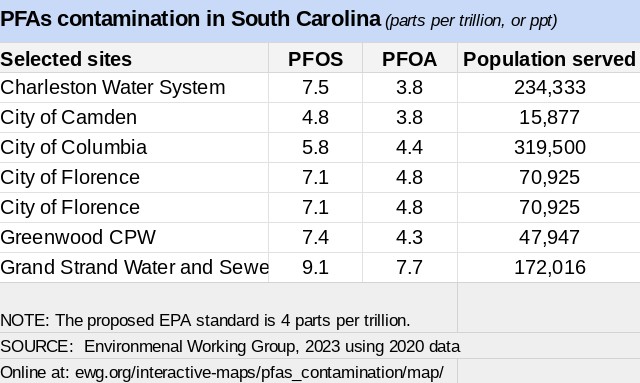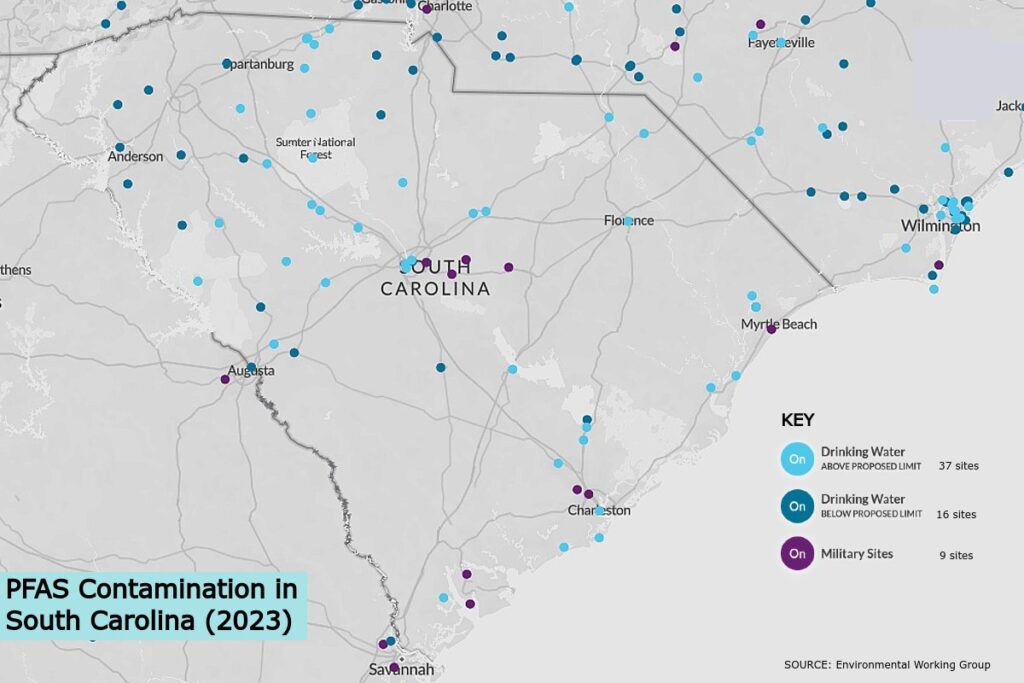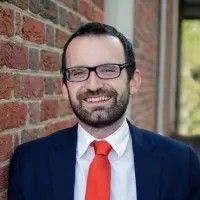STATEHOUSE REPORT | ISSUE 22.37 | Sept. 15, 2023
BIG STORY: Forever chemicals at 37 S.C. utilities above proposed standard, data show
MORE NEWS: Planned Parenthood sues again over abortion
LOWCOUNTRY, Ariail: Shutdown?
COMMENTARY, Brack: Schools need to teach media literacy
SPOTLIGHT: Palmetto Care Connections
ANOTHER VIEW: On Haley’s distorted narrative on immigration
MYSTERY PHOTO: Wrap-around porches
FEEDBACK: Send us your thoughts
Forever chemicals at 37 S.C. utilities is above proposed safe drinking water standard, data show

Staff reports | If you’ve ever wondered whether there’s something in the water, well, there is.
All across the Palmetto state, drinking water in 37 water utilities has levels of so-called forever chemicals, technically known as PFAs or “per- and poly-fluoroalkyl substances,” that are higher than a proposed federal standard, according to a study by the national nonprofit Environmental Working Group. [See map.]
People across the country are being exposed to these chemicals every day in the environment and tap water, despite not knowing “the long-term effects of a lot of these chemicals,” said Jared Hayes, senior EWP policy analyst at the group’s Washington, D.C. office. “The [American] public is essentially being used as guinea pigs,” he added.
PFAs are used to resist “grease, oil, water and heat,” according to the U.S. Food and Drug Administration. PFAs can be found in household items like rain jackets and non-stick cookware, and they are highly concentrated in firefighting foam, or AFFF. They’re colloquially known as “forever chemicals” because of their almost indestructible properties.
Right now, there is no federal standard for PFAs in drinking water. Some states have their own regulations, but South Carolina does not. But earlier this year, the U.S. Environmental Protection Agency proposed a national standard for an enforceable Maximum Contaminant Level (MCL) of 4 parts per trillion (ppt) for PFOS and PFOA, though the Maximum Contaminant Level Goal (MCLG) — defined as “the maximum level of a contaminant in drinking water where there are no known or anticipated negative health effects allowing for a margin of safety” — is 0 ppt for both. An MCL is the “maximum level allowed” and should be “as close as feasible to the MCLG, according to the agency.
If the new regulation were to become a reality, drinking water measurements from at least 37 of the state’s water utilities would be above the MCL, which means action likely would be required to reduce contamination, according to the EWG study.
 A chart at right shows representative PFOS and PFOA levels for seven of the state’s largest water utilities.
A chart at right shows representative PFOS and PFOA levels for seven of the state’s largest water utilities.
“Safe to drink”
In Charleston, for example, drinking water is safe, despite the presence of PFAs, said Charleston Water System (CWS) spokesman Mike Saia.
“We believe 100% that our water is safe to drink,” he said. “If people are considering using a filter, we try to inform them to make that decision by publishing an annual water report, which is easily accessible on our website.”
In May, the utility, which serves about a half million people in the Charleston area, reported concentrations of two PFA subtypes (PFOS and PFOA) at 4.2 ppt and 5.2 ppt, respectively, in its drinking water.
CWS Board Chair Thomas Pritchard told the Charleston City Paper that the agency “started testing for those things before most utilities in the country did, and we’ve been on top of it all along.”

Ongoing litigation
Concerns about PFAs have recently received more attention because a Charleston federal courtroom is the site of major national litigation over forever chemicals. U.S. District Judge Richard Gergel has been presiding over and managing a large number of related water pollution cases. More than 5,000 plaintiffs have filed PFAs-related lawsuits, according to news reports.
In a 2021 complaint at the U.S. District Court in Charleston, former U.S. Navy firefighter Michael Sloane of Spring, Texas, alleged that his exposure to firefighting foam, or AFFF, at military installations, including the Charleston Naval Base, was “directly and proximately” to blame for his testicular cancer.
Plaintiffs are seeking damages from major PFAs producers, such as 3M and Dupont, for allegedly knowing about the harms their chemicals would cause to individuals, property, natural resources and drinking water.
So far, there have been two major recent settlements. They include a tentative $10.3 billion to $12.5 billion in damages from 3M and a $1.185 billion from Dupont to public water suppliers nationwide. Both settlements still require court approval.
CWS’s Pritchard said the utility’s water treatment and wastewater treatment facilities were plaintiffs in the litigation that was suing PFAs makers because “we recognize that the cost going forward for treatment and future impacts is significant.”
There’s also a separate statewide lawsuit filed by S.C. Attorney General Alan Wilson. The complaint is pursuing legal action against companies like 3M and Dupont for allegedly having “misled the public” about the harmful effects of PFAs. Documents from EWG show manufacturers knew PFAs “posed health risks” as early as the 1960s — and many are still producing them.
But with this suit, there is a caveat that might impact plaintiffs like Sloane, the firefighter: The state’s lawsuit “expressly excludes…contamination or injury related to AFFF or AFFF products.” AFFF is the “primary source of PFAs at military installations,” according to EWG. But it reported the Department of Defense (DoD) also knew that PFAs might be dangerous — and as early as the 1970s. Until the AFFF completes its phase-out by October 2023, some firefighters are continuing to use it, according to one news report.
Huge cleanup costs
EWG’s Hayes noted it won’t be cheap to clean up water with levels of PFAs that are unsafe, if the proposed standard is approved. The billions of dollars in tentative settlements by 3M and Dupont are just “a drop in the bucket” needed by municipalities across the country to eliminate PFAs from their drinking water and wastewater treatment. For example, Saia said that it would “cost hundreds of millions of dollars” to bring Charleston’s drinking water below the proposed 4 ppt standard.
Time is playing a role in the results of the lawsuits in federal court. In an interview with the Charleston City Paper, attorney Joe Rice of Mount Pleasant-based law firm Motley Rice spoke of a program set up to “medically monitor [PFAs plaintiffs] as time goes forward, because [the diseases linked to PFAs exposure] are latent diseases.” Nonetheless, one study of air servicemen in mid-August confirmed what Sloane alleged all along — a link between exposure to some PFAs in AFFF and testicular cancer.
Andy Brack contributed to this story by reporter Lily Levin of the Charleston City Paper, which published an earlier version. Comment? Send to: feedback@charlestoncitypaper.com
Planned Parenthood sues again over abortion
Staff reports | Abortion providers filed a new lawsuit Thursday challenging the state’s six-week abortion ban just three weeks after the all-male state Supreme Court upheld the law signed by the governor in May.
![]() They are asking the court to answer an essential question: When, exactly, does South Carolina ban abortion?
They are asking the court to answer an essential question: When, exactly, does South Carolina ban abortion?
Part of the confusion about when the ban starts, the lawsuit says, stems from the definition of fetal heartbeat included in the law, which is described as “cardiac activity, or the steady and repetitive rhythmic contraction of the fetal heart, within the gestational sac.” Cardiac activity can occur as early as six weeks into a pregnancy, but is mostly formed around nine weeks, according to Planned Parenthood.
Attorneys for Planned Parenthood added that the ban should be interpreted to take effect after approximately nine weeks under the statute’s language, because that’s when most of the main parts of the eventual heart have developed.
In other recent news:
Trump leads Haley, Scott by big margin in S.C. poll. South Carolina Republican voters favor Donald Trump over his field of rivals — including former Gov. Nikki Haley and U.S. Sen. Tim Scott — for the GOP presidential nomination by more than 2-to-1 margin, according to a Post-Monmouth poll. The numbers: Trump, 46%; Haley, 18%; Scott, 10%.
S.C. tech colleges offer free tuition for high-demand career training. South Carolina technical colleges are offering more free tuition funds for students enrolled in courses that can provide pathways to careers in high-demand industries. Recent high school graduates and adults enrolled in qualified programs at any of the state’s 16 technical colleges are eligible for up to $5,000 from the Workforce Scholarships for the Future program.
President of S.C. school librarian group resigns amid tensions. Tensions between Michelle Spires, president of the S.C. Association of School Librarians, resigned amid tensions with the state superintendent Ellen Weaver.
Surprise Charleston board meeting was illegal, attorney says. A Monday night special meeting of the Charleston County School District’s Board of Trustees, leaving many community members confused and angry. S.C. Press Association attorney Jay Bender said the surprise meeting was illegal, as state law says the purpose of a closed session must be specific and must indicate what it relates to.
Murdaugh back in front of the judge who sentenced him. S.C. Circuit Court Judge Clifton Newman set a November state trial date for convicted murderer Alex Murdaugh to face fraud charges of stealing millions from the family of his late housekeeper.
Shutdown?

Award-winning cartoonist Robert Ariail generally has a biting or funny comment about the great state of South Carolina in his weekly cartoon. This week, he has something to say about government shutdowns. Love the cartoon? Hate it? What do you think: feedback@statehousereport.com.
Schools need to teach media literacy

By Andy Brack | With so much misinformation, disinformation, fake news and outright untruths floating around these days in cyberspace, it’s easier than ever to get misled.
 And because information jacklegs are trying to jack you up with bad information, something needs to be done about it. Otherwise, our democracy will suffer.
And because information jacklegs are trying to jack you up with bad information, something needs to be done about it. Otherwise, our democracy will suffer.
In the past, the news media have been the conduit for providing vetted, objective news and information to Americans so they can make decisions in our democracy. The newsgathering and reporting process disseminates information to help people pick candidates, decide on referenda, and hold their elected and appointed officials accountable. This is a fundamental responsibility of real news organizations not obsessed with clickbait.
But when the internet came along, all of the sudden individuals had the power to espouse information – and opinions – to the world. In the years since Al Gore invented it (that’s sarcasm, by the way), countless platforms have arrived that allow people to build new electronic communities – websites, Facebook, X/Twitter, Instagram, TikTok, just to name a few that are popular now.
With these communities, there are people who use it for good, legitimate reasons to spread information and others (such as Russians and non-democratic authoritarians) who want to interfere with democracy and elections by spreading lies to undercut faith in truth and the American system of checks and balances.
So these days from the comfort of a laptop or a phone in a mall, anyone is a publisher who can spread anything you want. And now, there’s so much information to sift through that it’s almost impossible to figure out what is real and what is Memorex.
That’s why voters and consumers of news should take a basic media literacy course. Doing so will help them avoid being punked by bad actors on the Internet. And it will provide them with resources so they can discern the truth.
The nonprofit Poynter Institute, a much-esteemed media organization that trains journalists and citizens, offers a free, one-hour short course on fact-checking called MediaWise. In it, “you’ll learn the basics of misinformation, how to quickly fact-check suspicious posts, and how to identify even the sneakiest of online ads.”
The group emphasizes this: “We will not be telling you how to feel about topics or issues. Instead, we will teach you how to identify digital misinformation and disinformation. Our goal is to help you make decisions that impact your life and your health, based on reliable, trustworthy information.”
Here’s another option South Carolina lawmakers should consider – provide a structure through high schools to teach information newbies about information discernment. In other words, provide media literacy training to young minds whose after-school hours are filled with scrolling through the internet so they better understand what’s true and not.
There’s precedent for this. Starting with this year’s freshmen, high school students are required to complete a one-half credit personal finance class to develop financial literacy skills. Why not a similar class on media literacy to help them figure out what’s news and what’s not?
State Treasurer Curtis Loftis and S.C. Economics CEO Jim Morris wrote in Statehouse Report in 2020 about how the lack of financial literacy is detrimental. “Without important knowledge about real-world topics such as loans, credit, taxes, and retirement, Americans can experience anxiety about money and often end up with growing debt that is difficult to overcome.”
The same can be said for an American population that has a hard time figuring out what is and isn’t accurate and truthful. Without skills to combat misinformation and disinformation, our democracy succumbs to things like the Jan. 6, 2021, insurrection in Washington. Let’s give our youngest citizens the tools they need to become good citizens in an information age that can be wacky.
Andy Brack is editor and publisher of Statehouse Report and the Charleston City Paper. Have a comment? Send to: feedback@statehousereport.com.
Palmetto Care Connections
 Statehouse Report is brought to you at no cost thanks to the generous support of underwriters, such as Palmetto Care Connections.
Statehouse Report is brought to you at no cost thanks to the generous support of underwriters, such as Palmetto Care Connections.
Established in 2010, Palmetto Care Connections (PCC) is a non-profit organization that brings technology, broadband and telehealth solutions to health care providers in rural and underserved areas in South Carolina. PCC hosts the Annual Telehealth Summit of South Carolina presenting state and national best practices and trends, as well as providing networking connections for health care, technology and broadband professionals.
The leader of the South Carolina broadband consortium, PCC assists health care providers in receiving broadband savings through the Federal Communication Commission’s Healthcare Connect Fund program. Since 2013, PCC has helped providers save more than $25 million in broadband costs.
PCC co-chairs the South Carolina Telehealth Alliance, along with the Medical University of South Carolina, serving as an advocate for rural providers and partnering with organizations to improve health care access and delivery for all South Carolinians.
- Learn more about Palmetto Care Connections.
On Haley’s distorted narrative on immigration

By Will McCorkle | It may seem ironic, but one of the most damaging and distorted narratives on immigration comes from our former governor and current presidential candidate, Nikki Haley. We are used to more anti-immigrant approaches and rhetoric from candidates like Donald Trump, but it carries specifically troubling implications coming from Haley who is herself a child of Indian immigrants.

Since she ran for governor back in 2010, Haley has used her own immigration story and heritage to go after undocumented immigrants. As she stated in a campaign ad for governor, “My parents are immigrants, they came here legally. They put in the time. They put in the money. They did what they were supposed to. It makes them mad when they see illegal immigrants come into this state.”
When she became governor, she signed one of the most anti-immigrant laws in the nation, which would have made it a crime for certain immigrants not to have their papers on them at all times. Some of the more draconian aspects of this law were blocked by the federal 4th Circuit Court of Appeals, but nevertheless she contributed to the already hostile environment in South Carolina towards immigrants. For example, we are one of the few states in the nation that bars undocumented students from studying at state colleges.
Unfortunately, this type of narrative that Haley has put forward deeply distorts the realities of immigration. It makes it appear that it is just a choice for people who decide to come in legally versus those who do not. Many people do not realize the strong limitations for who can immigrate.
For example, Haley’s parents were extremely educated. Her mother had studied law and her father had a Ph.D. before coming to South Carolina. In contrast, very few working to middle class immigrants can just legally migrate to the United States. Unless they have a close family member who can sponsor them, their only options are usually to come illegally or to seek to come through the asylum system.
I am sure Haley is aware of this great discrepancy between her parents’ experiences and the realities of many poor migrants at our Southern border, but it nevertheless plays into the anti-immigrant sentiment of the GOP base.
We have to be honest about what the current immigration system lacks – specifically the chance for more working and middle class individuals to actually legally migrate. The truth is that we are in desperate need for more workers. This is especially the case as the birth rate in the United States has declined.
We need to have an honest discussion about how to make it easier to migrate and avoid these distorted, often moralistic narratives about those who migrate the “right way” versus the “wrong way.” It overlooks how our immigration system actually works and the way privilege and wealth usually determines who is able to migrate.
I am glad that Nikki Haley’s family was successful and helped contribute greatly to our state. However, from my time working at the Southern border with asylum seekers, I also know that many of these migrants who do not come from wealth or privilege could also be making a positive impact if we could stop demonizing them and instead support them in their journey.
Summerville resident Will McCorkle teaches educational foundations and social studies education at a South Carolina college.
Wrap-around porches

Here’s an old house with wrap-around porches. But where is it and what is it? Send us your guess of what this photo shows – as well as your name and hometown – to feedback@statehousereport.com.
 Last week’s “Little white building,” a photo sent in by Daniel Prohaska of Mount Pleasant, is the Inglis-McIver Law Office in Cheraw. Hartsville’s Bill Segars shares that the office, now on Market Street, “was located on Front Street when it was built in 1810. This 12’x27′ wood framed building is one of the few surviving buildings left undamaged by Union troops when they destroyed the downtown district of Cheraw in 1865. It served as the law office for Henry Inglis, chief justice of S.C. Supreme Court, and John A. McIver, chairman of the S.C. Ordinance Secession Committee. It was moved to this location in 1947.”
Last week’s “Little white building,” a photo sent in by Daniel Prohaska of Mount Pleasant, is the Inglis-McIver Law Office in Cheraw. Hartsville’s Bill Segars shares that the office, now on Market Street, “was located on Front Street when it was built in 1810. This 12’x27′ wood framed building is one of the few surviving buildings left undamaged by Union troops when they destroyed the downtown district of Cheraw in 1865. It served as the law office for Henry Inglis, chief justice of S.C. Supreme Court, and John A. McIver, chairman of the S.C. Ordinance Secession Committee. It was moved to this location in 1947.”
Others who correctly identified it were: George Graf of Palmyra, Va.; Jay Altman and Elizabeth Jones, both of Columbia; Marian Covington of Cheraw; David Lupo of Mount Pleasant; Allan Peel of San Antonio, Texas; Frank Bouknight of Summerville; Rene McDaniel of Rock Hill; Don Clark of Hartsville; Kerry Berry, Lisa Campbell, Jessica Leviner and Carol Jones (please remember to send your hometown as well as your name).
>> Send us a mystery picture. If you have a photo that you believe will stump readers, send it along (but make sure to tell us what it is because it may stump us too!) Send to: feedback@statehousereport.com and mark it as a photo submission. Thanks.
Send us your thoughts
We encourage you to send in your thoughts about policy and politics impacting South Carolina. We’ve gotten some letters in the last few weeks – some positive, others nasty. We print non-defamatory comments, but unless you provide your contact information – name and hometown, plus a phone number used only by us for verification – we can’t publish your thoughts.
Have a comment? Send your letters or comments to: feedback@statehousereport.com. Make sure to provide your contact details (name, hometown and phone number for verification. Letters are limited to 150 words.
- ORDER NOW: Copies are in Lowcountry-area bookstores now, but if you can’t swing by, you can order a copy online today.
- Now available as an e-book!
ABOUT STATEHOUSE REPORT
Statehouse Report, founded in 2001 as a weekly legislative forecast that informs readers about what is going to happen in South Carolina politics and policy, is provided to you at no charge every Friday.
- Editor and publisher: Andy Brack, 843.670.3996
Donate today
We’re proud to offer Statehouse Report for free. For more than a dozen years, we’ve been the go-to place for insightful independent policy and political news and views in the Palmetto State. And we love it as much as you do.
But now, we can use your help. If you’ve been thinking of contributing to Statehouse Report over the years, now would be a great time to contribute as we deal with the crisis. In advance, thank you.
Buy the book
Now you can get a copy of editor and publisher Andy Brack’s We Can Do Better, South Carolina! ($14.99) as a paperback or as a Kindle book ($7.99). . The book of essays offers incisive commentaries by editor and publisher Andy Brack on the American South, the common good, vexing problems for the Palmetto State and interesting South Carolina leaders.
More
- Mailing address: Send inquiries by mail to: P.O. Box 21942, Charleston, SC 29413
- Subscriptions are free: Click to subscribe.
- We hope you’ll keep receiving the great news and information from Statehouse Report, but if you need to unsubscribe, go to the bottom of the weekly email issue and follow the instructions.
- Read our sister publication: Charleston City Paper (every Friday in print; Every day online)
- © 2023, Statehouse Report, a publication of City Paper Publishing, LLC. All rights reserved.
















 We Can Do Better, South Carolina!
We Can Do Better, South Carolina!